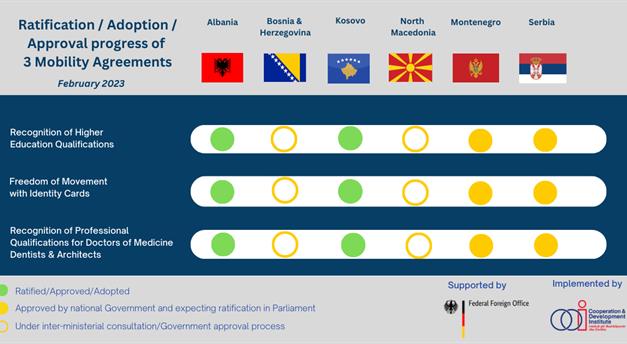
The leaders of the Western Balkans signed three regional agreements on mobility in Berlin, on November 3, 2022, at the "Western Balkans Summit - Berlin 2022" as part of the Berlin Process, which should enable 1) free movement with ID cards in the region, 2) recognition of higher education qualifications and 3) professional qualifications for doctors, dentists and architects.
The parties to the three agreements are Albania, Bosnia and Herzegovina, Kosovo, Montenegro, North Macedonia and Serbia. The Regional Cooperation Council (RCC) worked with all parties for two years to coordinate these agreements. The President of the European Commission - Ursula von der Leyen, in her statement regarding the conclusion of these three agreements, pointed out that this event is of key importance for the development of the Common Regional Market, but also for the integration of the Western Balkans into the European Single Market.
Ratification of agreements in the region
The most effective in ratifying these agreements were Albania and Kosovo, whose institutions completed the process of ratifying three multilateral agreements in accordance with their legislation in February 2023. They are followed by Montenegro and Serbia, whose governments forwarded these three agreements to their parliaments for consideration and declaration on ratification by the end of February 2023.
Bosnia and Herzegovina and North Macedonia are lagging behind in the ratification process, whose state governments have not yet considered the agreements, and have not even proceeded further in the process of ratification by the institutions of legislative and executive power. An infographic of the progress of each signatory party in the ratification of the agreement was prepared by our partners from the Cooperation and Development Institute.

Development of events in Bosnia and Herzegovina
The Council of Ministers of Bosnia and Herzegovina, in accordance with the proposed agenda of the 3rd session held on February 23, 2023, at the proposal of the Ministry of Foreign Affairs of Bosnia and Herzegovina, was supposed to consider the Draft Agreement on Freedom of Movement with Identity Cards in the Western Balkans with a Report on the Negotiations - one of the three signed agreement. This should have started the process of ratification of this agreement in the institutions of Bosnia and Herzegovina. However, the consideration and statement on this item of the Agenda was postponed, while the announcement about the 3rd Session of the Council of Ministers did not mention the reasons for the postponement.
It is evident that the process of ratifying the three agreements at the Council of Ministers was separated, while the institutions of Albania, Kosovo, Montenegro, and Serbia considered them at the same time, as a package of mobility agreements that were signed at the same time.
What does the international treaty ratification process look like in Bosnia and Herzegovina?
The Law on the Procedure for the Conclusion and Execution of International Agreements in Part V - Ratification of International Agreements prescribes the procedure for ratification in the following steps:
-
The negotiation delegation of Bosnia and Herzegovina submits the original text of the signed intenational agreement to the Ministry of Foreign Affairs within 15 days from the date of signing.
-
The Ministry of Foreign Affairs delivers to the Council of Ministers a draft decision on the ratification of an internmational agreement, with the text of the agreement as an integral part.
-
The draft decision on the ratification of the international agreement is made by the CoM and submitted to the Presidency.
-
The Presidency submits the concluded IA to the Parliamentary Assembly of BiH (consists of two Houses: the House of Representatives and the House of Peoples; here and after the Parliament), in order to obtain prior approval for ratification. The Presidency also delivers a detailed explanation of the Council of Ministers of Bosnia and Herzegovina on the need and conditions for concluding the relevant agreement in accordance with the law.
-
The Parliament decides on giving prior consent for the ratification of the international agreement.
-
After obtaining the consent of the Parliament, the Presidency decides on the ratification of the international agreement. The decision on ratification is signed by the Chairman of the Presidency.


